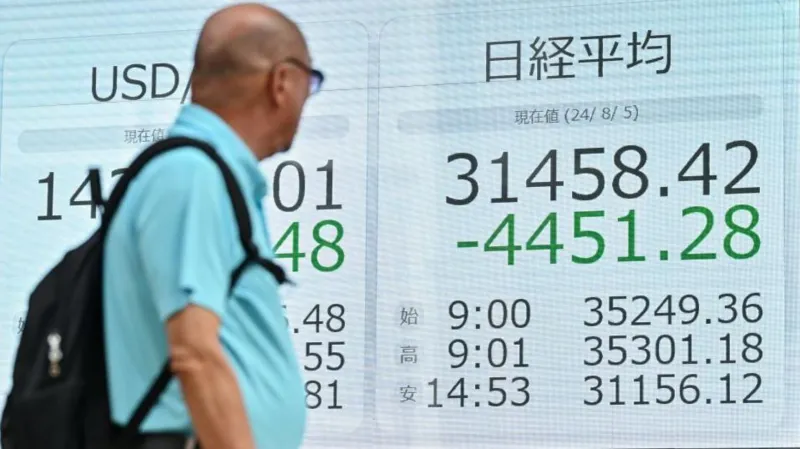Asian stock markets crashed on Monday after major global indexes fell sharply last week. In Japan, the Nikkei 225 dropped by 12.4%, the biggest points drop ever, while the Topix index lost 12.2%.
This happened after weak jobs data from the US on Friday raised concerns about the strength of the world’s largest economy. Additionally, the yen has been getting stronger against the US dollar since the Bank of Japan raised interest rates last week, making Japanese stocks more expensive for foreign investors.
Kei Okamura, a portfolio manager at Neuberger Berman, explained that the selloff was triggered by the yen’s sharp rise, causing global investors to worry about the earnings of Japanese companies, especially exporters like automakers. The yen has strengthened more than 10% against the US dollar over the past month, making Japanese goods pricier and less appealing to overseas buyers.
Unlike other central banks, the Bank of Japan recently raised interest rates to the highest level since the 2008 global financial crisis. This move came as inflation in Japan increased more than expected in June, while the economy shrank in the first three months of the year due to a weaker yen and low household spending.
Stock markets in other parts of the Asia-Pacific region also took a hit. Taiwan’s main index and South Korea’s Kospi both fell more than 8%. India’s NSE Nifty 50 was down 2.8%, Australia’s S&P/ASX 200 dropped about 3.6%, Hong Kong’s Hang Seng fell 2.5%, and Shanghai’s stock exchange was 1.4% lower. Even cryptocurrencies like Bitcoin saw declines, dropping to around $50,000, its lowest since February.
On Friday, US stocks fell sharply after jobs data showed that only 114,000 jobs were added in July, much fewer than expected. This raised concerns that the US jobs boom might be ending and led to speculation about potential interest rate cuts by the Federal Reserve.
Despite the US economy expanding at an annual rate of 2.8%, there are fears of a slowdown. Shanti Kelemen, chief investment officer at M&G Wealth, told BBC’s Today programme that the economic data could be interpreted positively or negatively, making the direction of the economy uncertain.
Stock markets were already worried about high borrowing costs and the possibility that the recent rally in share prices, partly driven by optimism over artificial intelligence (AI), might be ending. The Nasdaq index dropped about 10% from its recent peak, a decline known as a “correction.” On Friday, the Dow Jones Industrial Average fell 1.5%, and the S&P 500 ended 1.8% lower, following similar drops in Asia and Europe.
Adding to the market anxiety, Warren Buffett’s firm Berkshire Hathaway revealed over the weekend that it had sold about half its stake in US technology giant Apple .
Credit : BBC
https://www.bbc.com/news/articles/c6p224j24x0o

